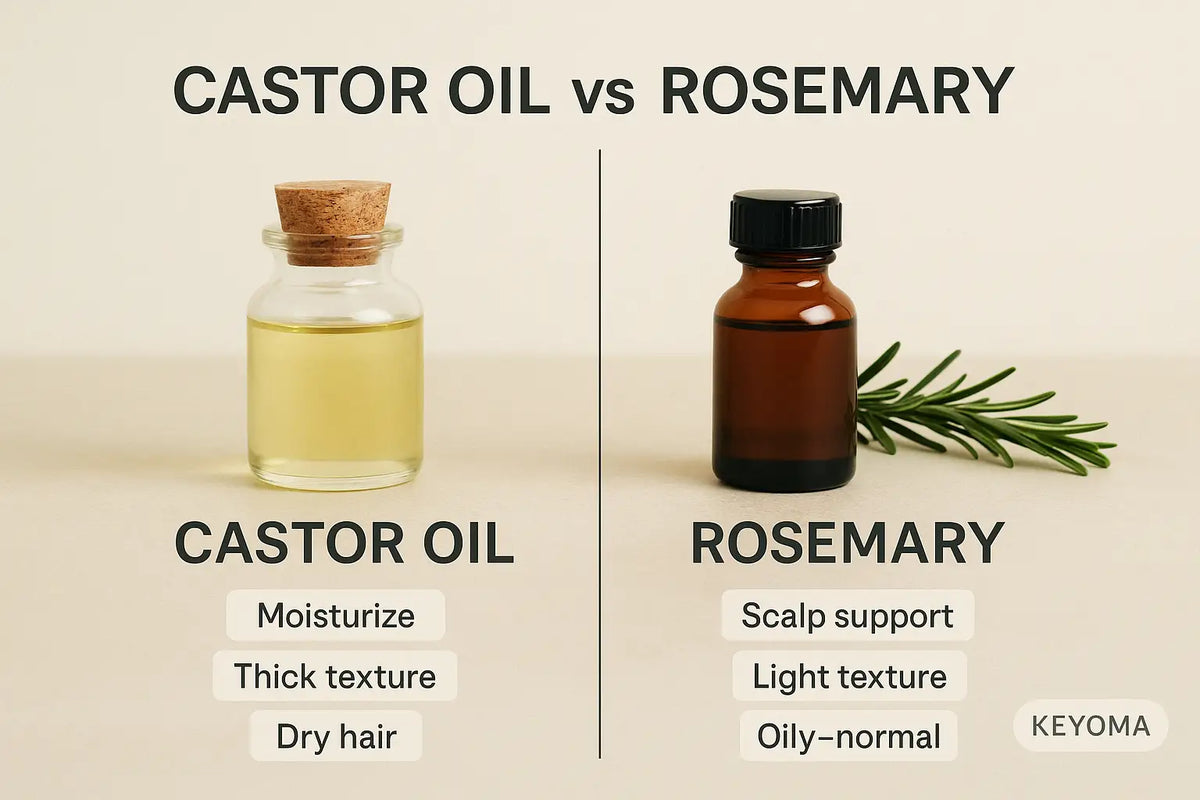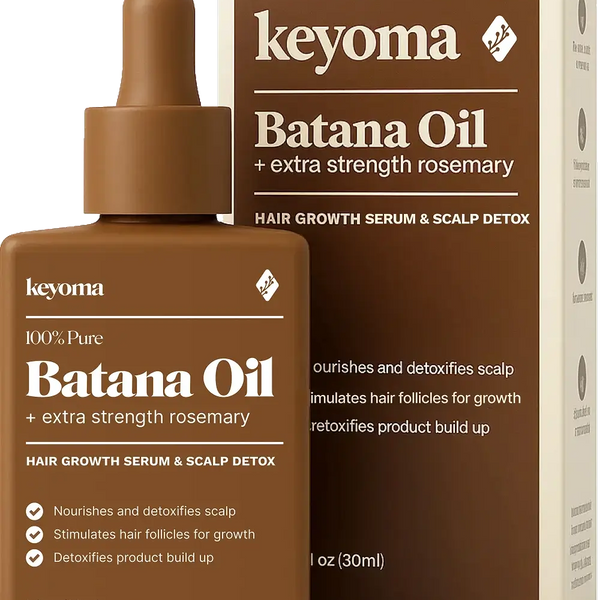In this article
If you’ve spent any time looking into natural hair growth remedies, you’ve likely run into hair oils. Rosemary oil and castor oil both have reputations for helping hair look longer and healthier, but they tend to work in different ways.
The real question is which suits you best. It depends on your hair type, scalp condition, and goals. Rosemary oil is often used to stimulate the scalp and encourage new growth, while castor oil is very moisturizing and can reinforce fragile strands.
To choose well, learn how each oil works and what your hair needs. If you’re dealing with thinning, dryness, or breakage, one of these oils, or a thoughtful blend, may give your routine a useful boost.
Key Takeaways
-
Rosemary and castor oils support hair goals differently, choice depends on hair type and needs.
-
Castor oil contains ricinoleic acid, moisturizes deeply, calms inflammation, and strengthens hair shafts.
-
Rosemary oil stimulates follicles, may reduce DHT activity, and protects against oxidative scalp stress.
-
Both oils can be used as scalp massages, pre-shampoo treatments, or diluted add-ins.
What is Castor Oil?
Castor oil is pressed from the seeds of the castor bean plant, Ricinus communis. While the raw seeds are known to contain toxins, the extracted oil used in hair care is valued. It shows antibacterial and antifungal activity that supports skin and scalp comfort.

Castor Oil Benefits
Castor oil has been part of hair care for generations. Its rich, heavy feel makes it a strong moisturizer and conditioner. Beyond coating the hair shaft, it can reach the scalp and follicles with helpful compounds. This oil contains omega-6 fatty acids, vitamin E, and minerals that nourish both hair and scalp.
Ricinoleic Acid Magic
The standout component in castor oil is ricinoleic acid, which makes up about 90% of its fatty acids. This molecule has natural antimicrobial and anti-inflammatory actions that support a balanced scalp.
It may also help normalize pH and loosen excess sebum that can clog follicles. When you apply it to the scalp, a gentle warming effect can improve circulation, bringing oxygen and nutrients to follicles. Its structure lets it penetrate the hair shaft to reinforce it and limit protein loss tied to breakage and thinning.
Anti-Inflammatory
Inflamed scalp skin can quietly undermine healthy growth. Castor oil’s soothing properties help calm irritation, easing redness, itching, and flaking. By settling the scalp environment, castor oil sets the stage for follicles to do their job.
ts thick texture also creates a light barrier that locks in moisture and shields against external irritants, helping maintain conditions that support strong hair.
What is Rosemary Oil?
Rosemary oil is distilled from the Rosmarinus officinalis plant. It’s anti-inflammatory and rich in antioxidants, and it has a long history in cooking, aromatherapy, circulation support, and beauty uses for skin and hair. The fresh, calming scent feels soothing on the scalp.

Rosemary Oil Benefits
Rosemary oil has been used for centuries to support hair growth, and several studies point to meaningful effects. It contains carnosic acid, rosmarinic acid, and ursolic acid, which target pathways tied to hair growth. The herbaceous aroma also offers aromatherapy benefits that may ease stress, a factor that can contribute to shedding.
DHT Blocking
One notable potential of rosemary oil is limiting dihydrotestosterone (DHT), a hormone closely involved in androgenetic alopecia. When DHT binds follicle receptors, follicles can shrink and produce finer strands until growth stops.
Research suggests rosemary compounds may inhibit 5-alpha-reductase, the enzyme that converts testosterone to DHT, which is why it may help in pattern thinning.
Antioxidant Protection
Free radicals can speed up hair aging and thinning. Rosemary oil supplies antioxidants that neutralize these reactive molecules before they harm follicles. This helps protect the scalp and hair from stressors like pollution and UV, which can weaken strands over time. By reducing oxidative stress, rosemary supports a healthy scalp environment and can help preserve the look of natural color.
Rosemary Oil vs. Castor Oil for Hair: Side-by-Side Comparison

How to Use Castor and Rosemary Oil for Hair Growth
Both oils can be helpful in your routine, but using them the right way matters.
How to Use Castor Oil for Hair Growth
Castor oil is dense, so small amounts are enough. Here’s how to apply it well.
1. Scalp massage: Warm a small amount of castor oil and massage it into your scalp to improve absorption.
2. Mix with a lighter oil: Blend it with a lighter oil like jojoba or argan to make application easier. I noticed a 1:2 mix with jojoba spread evenly without feeling heavy.
3. Use as a pre-shampoo treatment: Smooth it onto the scalp and strands 30 minutes before washing to deeply hydrate.
How to Use Rosemary Oil for Hair Growth
Rosemary oil is potent and should be diluted with a carrier oil before use. Here’s a simple approach.
1. Scalp massage: Mix a few drops of rosemary oil with a carrier like coconut or almond oil, then massage into the scalp.
2. Add to shampoo: Put a few drops into your shampoo or conditioner for an easy add-in.
3. Overnight treatment: Apply diluted rosemary oil to the scalp before bed and rinse in the morning.
Can You Use Castor Oil and Rosemary Oil Together?
Yes. Combining them can deliver moisture plus scalp stimulation. Try adding a few drops of rosemary oil to castor oil to make a focused hair mask.
Choose Smart and Start Your Hair Regrowth Journey with Keyoma
If you want scalp stimulation and help with pattern thinning, use rosemary oil. If you need moisture and breakage control, use castor oil. Many people do best with both, since rosemary targets follicles while castor strengthens and seals.
Set a simple plan. Patch test first. Keep styles low-tension. Dilute rosemary for the scalp. Use castor as a light pre-wash mask. Massage the scalp a few minutes per session. Track photos monthly and stick to your routine.
Ready to act today? Try Keyoma Batana Oil with Rosemary to nourish the scalp and strengthen strands while you work on long-term regrowth. Finish your routine with a few drops 3 to 4 nights per week and stay consistent. End your journey guesswork with a proven hair oil mixture: Keyoma Batana Oil with Rosemary.
Featured Product
100% Pure Batana Oil + Rosemary









